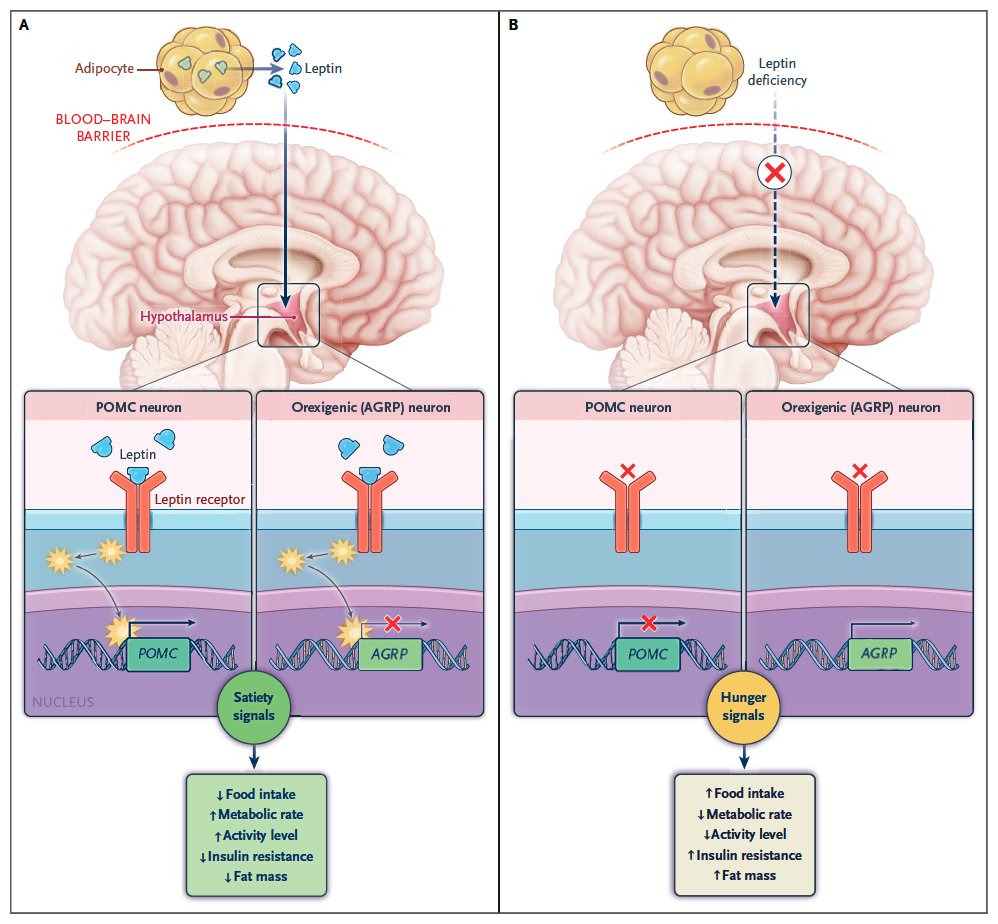Leptin Resistance in Childhood Obesity
This blog post examines the role of leptin resistance in childhood obesity. It discusses the science behind the study, as well as the successful treatment strategy informed by biochemical experiments.

NEJM
The New England Journal of Medicine (https://t.co/YGfDrRsIhE) is the world’s leading medical journal and website.

-
Childhood obesity is a challenging clinical condition. Secondary causes of obesity are often sought but rarely found, and few can be addressed by successful therapeutic interventions.
— NEJM (@NEJM) June 21, 2023
Science behind the Study: https://t.co/EpJq3Of292 1/10#endocrinology -
Leptin was once hailed as a treatment for most cases of childhood obesity but quickly lost favor when resistance to leptin was noted. 2/10
— NEJM (@NEJM) June 21, 2023 -
In NEJM, Funcke et al. describe variants in the leptin gene in 2 severely overweight children whose conditions were resistant to treatment with metreleptin & biochemical experiments that informed a successful treatment strategy. Read the report: https://t.co/p7UfJemmpj 3/10
— NEJM (@NEJM) June 21, 2023 -
Leptin is a peptide hormone and is made predominantly by adipose tissue. Storage of excess triglycerides leads to expansion of lipid droplets during feeding; as a result, adipocytes secrete leptin into the circulation. 4/10 pic.twitter.com/D8ib4Fap7J
— NEJM (@NEJM) June 21, 2023 -
After crossing the blood–brain barrier, leptin inhibits orexigenic neurons in the hypothalamus by binding to the long form of the leptin receptor, which is present on the surface of these neurons. 5/10
— NEJM (@NEJM) June 21, 2023 -
Leptin thereby has the effect of increasing energy expenditure and decreasing food intake. However, as levels of circulating leptin increase, the hormone somehow becomes less effective at inhibiting these orexigenic neurons. 6/10
— NEJM (@NEJM) June 21, 2023 -
Acquired leptin resistance due to obesity without a known genetic cause is characterized by increased levels of serum leptin. Persistently high leptin levels lead to partial antagonism and reduced bioactivity. 7/10 pic.twitter.com/9zzeBOz5SX
— NEJM (@NEJM) June 21, 2023 -
A similar phenomenon occurs in most patients with obesity who are treated with metreleptin. Here, too, partial antagonism between endogenous leptin and metreleptin is thought to cause resistance to metreleptin, although the mechanism of partial antagonism is not clear. 8/10
— NEJM (@NEJM) June 21, 2023 -
There may be posttranslational changes in the leptin molecule or altered leptin transport across the blood–brain barrier. Theoretically, lowering leptin levels (to reduce the partial antagonism) could reduce leptin resistance. 9/10
— NEJM (@NEJM) June 21, 2023 -
Read the science behind the study in the editorial “Antagonizing the Leptin Receptor in Obesity” by Clifford J. Rosen, M.D.: https://t.co/EpJq3Of292 10/10#genetics
— NEJM (@NEJM) June 21, 2023
